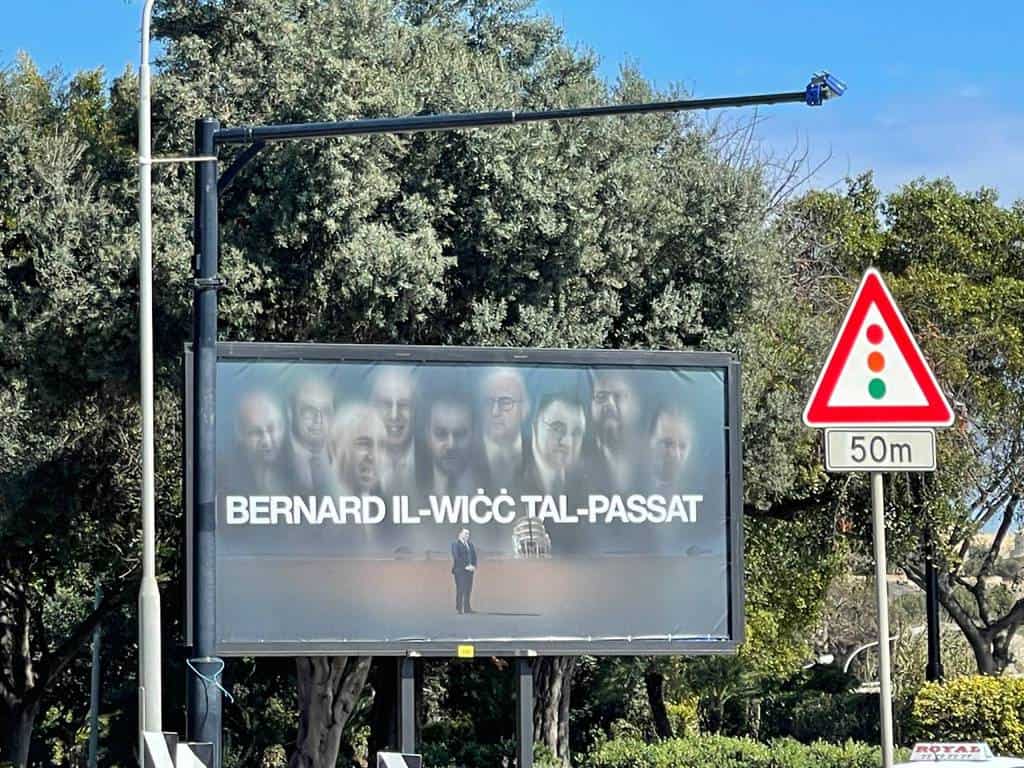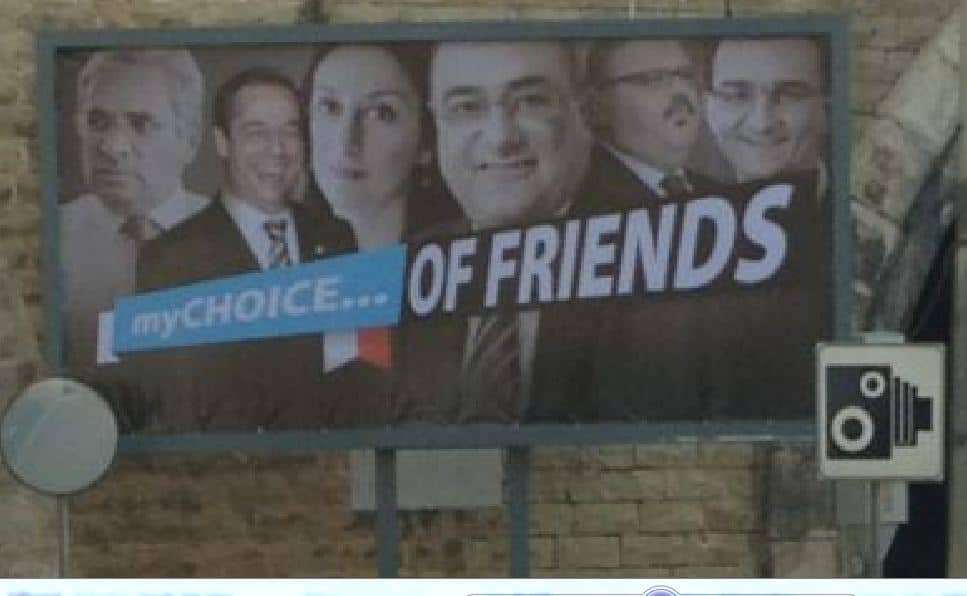
Photo: Miguela Xuereb (Newsbook)
It was, I suppose, only a matter of time. A few days ago, Labour ran a campaign video that featured me as a cause of division in the PN. Now I’ve been upgraded to a billboard, alone in a row of 10 men not contesting the next general elections, nor, indeed, having contested the last ones.
The billboard says “Bernard (Grech) is the face of the past”. I am indeed a fractional, altogether irrelevant fragment of the PN’s past having been a candidate on its ticket in 2013. But that is not the reason I’m on the billboard. If, in October 2017, when Daphne was killed, I did not move to full-time journalism, I’d have been forgotten and I’d have been ignored like many one-time candidates who could not even be remembered as flashes in the pan given how abysmal my electoral performance was.
I’m on that billboard alongside a row of men, a few I call my friends, a few I have varying degrees of respect for, a few I would be embarrassed to be seen greeting in the street, because of this blog and the work I’ve been doing these last 4 years or so.
Why is my work perceived as a liability for the Nationalist Party and a reason for people recognising me in that billboard to vote Labour instead?
I think it’s because that image of the man who looks like me and the man who is writing this are different people. That latter me, the person who is writing this and whom you know from reading this, is not angry all the time. I don’t look like that angry man on the billboard most of the time. I remember when that photo was taken, and I looked up a record of the moment that picture was taken. It was at a speech I gave in Valletta on 16 October 2018, a year to the day from Daphne’s killing. You’d know that from the background of the photo if it hadn’t been blacked out.
I looked up the speech and I’m reproducing it here if for nothing else, to place that image in its proper context.
I listened to it again this morning and even now, at the risk of sounding irredeemably incapable of mortification, I don’t regret what I said. I think I had some good reasons to be angry. A journalist had been killed. The government was saying that the arrest of three button men was all the justice she deserved. Senior politicians were insinuating Daphne had been killed by her sons. The Great Siege Memorial had been walled up just because we dared use it as a venue for our protests. The government’s campaign to censor our flowers and candles protest that would last another year and a half had at the time of the speech been going on for a month. The courts rejected a plea to stop the government crushing our protest while it considered our claim (eventually accepted) that our very fundamental rights were being suppressed.
Yeah, I was angry. I look like that when I’m angry.
That same week I was mocked for delivering that speech. Karl Stagno Navarra had a field day on One TV. And the cut-out freeze became the icon with which Labour would represent me. That image became the only way tens of thousands of followers of One TV (and that’s not just Laburisti, mind you) knew me.
In the heat that would follow, in the turmoil within the Nationalist Party, thousands of traditional supporters of the PN would also only perceive me through One TV’s lens. That image would become indelible. No one would wonder why I’m so sullen and angry. They would accept that is just who I was.
They would recognise me in the street and react as one should when faced by an evil, ever-angry monster. Right up to last Saturday I must report people to the police for shouting, insulting, and threatening me to my face in front of my children, to ask for yet another protection order by yet another magistrate.
People who never, ever read what I write find no incongruence between the image and my character, in the same way that it would never occur to them to find it odd that a journalist is plastered alongside 9 politicians in a negative campaign billboard.
The irony is that thematically I’m on the billboard because I criticised, in some cases quite vigorously, some of the politicians on that same billboard. Consider the paradox. The billboard disqualifies me as a journalist because my alleged PN ties deprive me of the ability to be objective. But then I’m a cause of division in the PN because I criticise it.
Of course, if you do watch my speech from 2018 from which that offensive image was captured you may think differently. You may think I ought to feel ashamed, that I was wrong, or too emotional, or too irrational.
For a more objective viewer perhaps what may have sounded right in 2018 could sound wrong now. The perceptions of audiences change, even audiences that in 2018 were prepared to read what I write and now no longer do. I have lost readers along the way. Since that speech I would be branded a mercenary for having insisted on billing private commissions. And then came the big blow of being called out for “juicing up” the threats and the harassment that for a while forced me to step away from all the noise altogether.
While I was away, I struggled with guilt, of being responsible for the trouble I had got myself into, of provoking all the harassment, of leaving my wife and children alone for some time while I took care of my needs. I struggled with disappointment as well. I’m not a political candidate, not because it is something I consider beneath me, but because I know I am beneath it. The electorate told me that in no uncertain terms in my first and only abortive attempt at front line politics. Indeed, in political terms I am a man of the past, a fact I have never attempt to reverse.
While I was away, I was taught to accept my relative ineffectiveness. Far more people know that destructive image on that billboard of an angry man, so displeasing to the eye, the vague awareness of whom is enough to get you to vote Joseph Muscat’s party back into power, than there are people who still read what I write. That image that represents me so poorly is more effective in the world out there than all the thousands of words I write every day.
While I was away, I was taught to embrace my ordinariness, to delight in the dim light of the comically weak fire on my breath, to outgrow the disappointment with myself that however much I wanted to, I could not be as useful to others as I thought I should have been.
All I feel when I see that image on the billboard is sadness at the fact that I live in a country that is incapable of shivering at the association that should be obvious with the memory of Daphne’s face on very similar Labour billboards in elections past. That we wake up every morning apparently deprived of memory even of the so recent fate of a journalist awarded with the dubious privilege of a space in the negative propaganda of a tyrannical political party and whose life was ended in a ball of fire and the perverse celebrations of those who only knew her as a hateful image on a billboard.

As I watched again that speech I had given in 2018, I saw myself tell me now that I cannot rely on the hope of final victory to motivate me to go on. That angry man from 2018 reminds me that I must choose where I want to be right now.
And the answer is that even if alone, even when no one is left to read this, I’d rather be angry and mocked for it, than drunk on the profits of complicity with the bastards who killed Daphne or stood back to let her die.